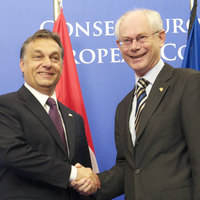On Jan. 1, the same day Hungary began its six-month EU presidency, Hungarian Prime Minister Viktor Orban's government introduced a law requiring "balanced" media coverage and instituting registration requirements for those disseminating information. The international furor over the new law threatens Hungary's chances of making the most of its EU presidency, while offering a crumb of hope to a severely weakened opposition.
France, Germany, Luxembourg, the U.K. and other EU members expressed concern over the media law, but Orban simply dismissed the criticism as misinformed and anti-Hungarian. He had already angered the business community by imposing surtaxes on banks, telecoms and retail and energy companies, and had alarmed others by seizing savings from private pension funds. A planned move to adopt a new constitution in the spring may be met with yet more frustration.
The job of shepherding the EU through its agenda would be hard enough even without the negative reception with which Hungary's domestic policies have been met by other EU members. The timing "could not be more inauspicious," notes Krisztian Szabados of the Political Capital Institute, in light of the EU's ongoing debt and euro crisis. Among Budapest's main challenges will be guiding the union towards its first "European semester," a mechanism for flagging imbalances in member states' budgets, and overseeing the preparation of the union's 2012 budget.

